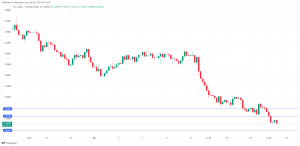Economics
European Central Bank Laying Groundwork For Digital Euro
European Central Bank Laying Groundwork For Digital Euro
Authored by Michael Maharrey via SchiffGold.com,
The European Central Bank (ECB)…
European Central Bank Laying Groundwork For Digital Euro
Authored by Michael Maharrey via SchiffGold.com,
The European Central Bank (ECB) is laying the groundwork to roll out its version of a central bank digital currency (CBDC).
According to the ECB’s website, the “preparation phase” for the digital euro begins in November and “builds on the findings from our investigation phase.”
The aim of the preparation phase is to lay the foundations for the potential issuance of a digital euro. This includes finalising the digital euro rulebook and selecting providers that could potentially develop a digital euro platform and infrastructure. And it will involve testing and experimenting to develop a digital euro that meets both the Eurosystem’s requirements and user needs.”
The preparation phase is expected to last for two years.
This doesn’t mean a European CBDC is a certainty, but the ECB is clearly laying the groundwork. According to the bank, it won’t be able to roll out a digital euro until the EU adopts a legislative framework.
CBDCs exist as virtual banknotes or “coins” held in a digital wallet on a computer or smartphone. The difference between a central bank (government) digital currency and peer-to-peer electronic cash such as bitcoin is that the value of the digital currency is backed and controlled by the government, just like traditional fiat currency. The ECB describes the digital euro as “an electronic means of payment available free of charge to everyone.”
Like cash today, you could use it anywhere in the euro area, and it would be secure and private. In our increasingly digitalised society, a digital euro would be the next step forward for our single currency.”
Bankers and government officials are working hard to sell the public on the benefits of a digital currency.
Proponents tout the convenience of digital currency. The ECB emphasized that “making public money available for digital payments … would make all our lives easier.” Officials also claim a CBDC will help stop dangerous criminals who take advantage of the intractability of cash.
The Central Bank of Spain recently issued a note extolling the virtues of a digital euro. Banco de España said a CBDC would help move the EU into the future and “underpin citizens’ confidence in the monetary system.”
The infrastructure that allows us to make electronic payments (machines, connections, protocols …) is a key part of our financial system and the Eurosystem ensures its soundness and availability. The digital euro would be based on a public and European infrastructure that would strengthen the European financial system and make it more independent of foreign alternatives.”
The Spanish central bank said a CBDC would have advantages over “physical currency” because cash doesn’t allow people to “exploit all the advantages offered by the increasing digitization of the economy and society.”
Bank of Finland board member Tuomas Välimäki said the development of a digital euro is “the most topical project” in the European payment sector.
The possible introduction of a digital euro would give consumers the option of paying with central bank money wherever electronic payment is accepted.”
The EU is not alone in developing a government-issued digital currency.
According to a recent survey by the Bank for International Settlements (BIS), as many as 24 CBDCs could be in circulation by 2030.
So far, the Bahamas, the Eastern Caribbean, Jamaica and Nigeria have issued retail CBDCs.
Many other countries, including China, India, and the US have launched pilot programs. Based on the BIS survey, “More than half of central banks are conducting concrete experiments or working on a CBDC pilot.”
The Dark Side
Despite the rosy picture painted by central bank officials and politicians, CBDCs have a dark side that they don’t talk about out loud – the promise of control.
Central bank digital currencies are part of a broader “war on cash.”
The elimination of cash creates the potential for the government to track and control consumer spending, and it would become impossible to hide any transaction from taxing authorities. Digital economies would also make it even easier for central banks to engage in manipulative monetary policies such as negative interest rates.
Imagine if there was no cash. It would be impossible to hide even the smallest transaction from the government’s eyes. Something as simple as your morning trip to Starbucks wouldn’t be a secret from government officials. As Bloomberg put it in an article published when China launched a digital yuan pilot program in 2020, digital currency “offers China’s authorities a degree of control never possible with physical money.”
The government could even “turn off” an individual’s ability to make purchases. Bloomberg described just how much control a digital currency could give Chinese officials.
The PBOC has also indicated that it could put limits on the sizes of some transactions, or even require an appointment to make large ones. Some observers wonder whether payments could be linked to the emerging social-credit system, wherein citizens with exemplary behavior are ‘whitelisted’ for privileges, while those with criminal and other infractions find themselves left out. ‘China’s goal is not to make payments more convenient but to replace cash, so it can keep closer tabs on people than it already does,’ argues Aaron Brown, a crypto investor who writes for Bloomberg Opinion.”
Economist Thorsten Polleit outlined the potential for Big Brother-like government control with the advent of a digital euro in an article published by the Mises Wire. As he put it, “the path to becoming a surveillance state regime will accelerate considerably” if and when a digital currency is issued.
Tyler Durden
Fri, 10/27/2023 – 03:30
monetary
interest rates
central bank
mises
negative interest rates

Argentina Is One of the Most Regulated Countries in the World
In the coming days and weeks, we can expect further, far‐reaching reform proposals that will go through the Argentine congress.
Crypto, Crude, & Crap Stocks Rally As Yield Curve Steepens, Rate-Cut Hopes Soar
Crypto, Crude, & Crap Stocks Rally As Yield Curve Steepens, Rate-Cut Hopes Soar
A weird week of macro data – strong jobless claims but…
Fed Pivot: A Blend of Confidence and Folly
Fed Pivot: Charting a New Course in Economic Strategy Dec 22, 2023 Introduction In the dynamic world of economics, the Federal Reserve, the central bank…



















